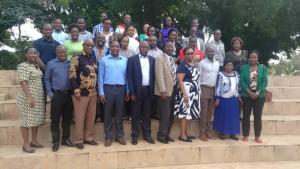Tanzania launches training for national rapid response teams with focus on Ebola
25-28 June 2018, Morogoro: As part of ongoing efforts to prepare countries in the African Region to respond effectively to disease outbreaks and humanitarian disasters, the World Health Organization in collaboration with the Ministry of Health and President’s Office President's Office Regional and Local Government authorities (PORALG) organized a training of national rapid response teams on Ebola virus disease (EVD) to ensure that the country has the people with the skills and expertise to prevent and respond to EVD.
Following declaration of Ebola virus disease (EVD) outbreak in DRC on 8 May 2018, Ministry of Health, WHO and partners initiated implementation of preparedness measures to strengthen countries readiness to respond to the epidemic in case it occurs in the country. Furthermore, risk mitigation measures have been ongoing including enhanced surveillance through travellers screening at Points of entry along the border of Tanzania and DRC. The Ministry has prioritised 8 regions as having high risk of EVD due to the geographical location namely: Mbeya, Kigoma, Songwe, Mwanza, Rukwa, Katavi, Kagera and Dar es Salaam.
The EVD RRT training aims at reinforcing the capacity and skills of multidisciplinary Rapid Response Teams (RRT) and their individual members to early detect and effectively respond to a potential EVD outbreak.
Speaking during the opening of the training, the Assistant Director Emergency Preparedness and Response Section, Dr. Elias Kwesi emphasized the importance of the training in capacitating the national TOTs for responding to an EVD outbreak and the expectation that the training will be cascaded to the sub-national levels. He expressed his appreciation to WHO for the tireless support in building the country’s operational readiness to the threat of Ebola.
WHO presentation in the opening narrated the Operational readiness score stood in between 24% to 74%. The participants were informed that the assessment led to a three month contingency plan prepared and one of the action points was to build capacity of the National and Sub-National RRTs on EVD.
The four day training involved epidemiologists, clinicians, laboratory experts, communication officers, social mobilization experts, logisticians, psychosocial support experts, data managers, infection prevention and control (IPC)/Environmental experts who are likely to be deployed as members of Rapid Response Teams when an alert is given on a suspected EVD case in the country.
Training course included interactive plenary sessions, group works and simulation exercises covering essential functions of multidisciplinary rapid response teams including disease surveillance, risk assessment, infection prevention and control, contact tracing, risk communication and safe burial.
Upon completion of the EVD RRT training, participants will conduct subnational training covering the 8 prioritized EVD high risk regions.
The emergency training for national rapid response teams is part of WHO’s regional action plan to support improvement in preparedness and readiness measures for EVD in the Region.



